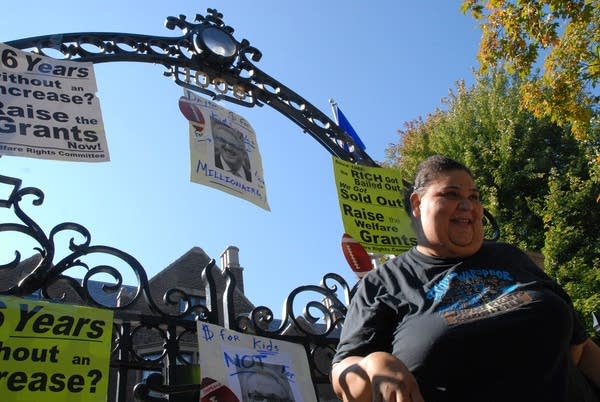Protesters:Vikings stadium funding could have helped poor people

Go Deeper.
Create an account or log in to save stories.
Like this?
Thanks for liking this story! We have added it to a list of your favorite stories.

The Minneapolis-based Welfare Rights Committee says Minnesota could have doubled welfare grants to poor people with the money the state banked on a new Vikings stadium just this year.
The protesters charge that the state has not increased General Assistance grants, known as MFIP, or Minnesota Family Investment Program, since 1986. A family of two with no other countable income has been eligible for $437 a month for the last 26 years.
"It's chronic for people on welfare. We want these grants raised now, and stop giving our money out to people like Zygi Wilf and others who are hanging around, trying to be grifters... We want Gov. Dayton, let him see that this is very important. Show these people a way out of poverty," said Verdella Ena, one of about a dozen protestors at the gate of the Governor's mansion this morning.
Turn Up Your Support
MPR News helps you turn down the noise and build shared understanding. Turn up your support for this public resource and keep trusted journalism accessible to all.
State Department of Human Services officials confirmed those numbers this morning, but pointed out that similarly situated people would likely also be eligible for SNAP, better known as food stamps, and that the cash and food grant has risen 32 percent since 1998 for a family of three.
Protesters said the $24 million the state put in a stadium reserve fund would have been better spent on the poor this year. The Dayton administration has earmarked part of a one-time tobacco tax to stadium financing, as a backup to debt service expected to come in from new corporate taxes.
The new stadium does have some anti-poverty measures written into authorizing legislation, including a 32-percent minority employment guideline for workers building the new facility. The Minnesota Sports Facilities Authority has also hired an equity director and a training and recruiting firm to help bring poor and minority workers to the job. Thousands of workers are expected on the stadium job site over the next three years.
Welfare Rights Committee organizer Linden Gawboy, of Minneapolis, wasn't impressed.
"We're about hard numbers. I'd like to see how many people that will help. I mean, it's great, but everyone who is on assistance will not get those jobs. We have to look at the reality, that if there's not enough jobs, people need help. People shouldn't be forced into homelessness on a grant that puts you in extreme poverty."
Here's the state's fact sheet on MFIP and SNAP:


